Posts Tagged ‘attachment’
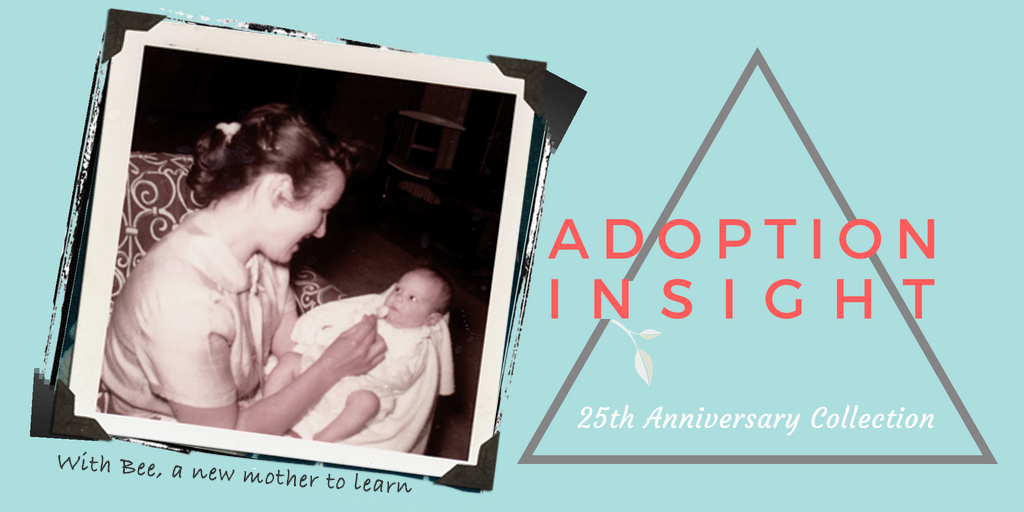
As a society we are rightly outraged by the separation of immigrant parents and children. That these children will suffer emotional wounds due to this separation, amidst such chaotic circumstances, is collectively, instinctively assumed. But where is the outrage—or even a drip of compassion—over the separation of mothers and babies in the case of adoption?
This glaring double standard regarding separation trauma was one of the forces that impelled Nancy Verrier to begin writing about this elephant in the room. You see, by the 1980s it was increasingly accepted by many progressive doctors and theorists that separation of mother and newborn was best avoided in general. But there was a cultural blind spot when it came to adoption!
[In case you’re new to this Adoption Insight 25th Anniversary situation, all year I’m reissuing my trove of adoption articles I wrote in the 90s. Usually I include a brief introduction and/or a bit of never-before-shared behind-the-scenes scoop on how it came to be. Today’s introduction is an article in itself… but you will in fact come to the original article below, “In Appreciation of The Primal Wound.”]
Honesty in adoption—the last American taboo?
(more…)
Tags: adoption, attachment, open adoption, prenatal, reform, separation trauma
Posted in Adoption Insight | 12 Comments »

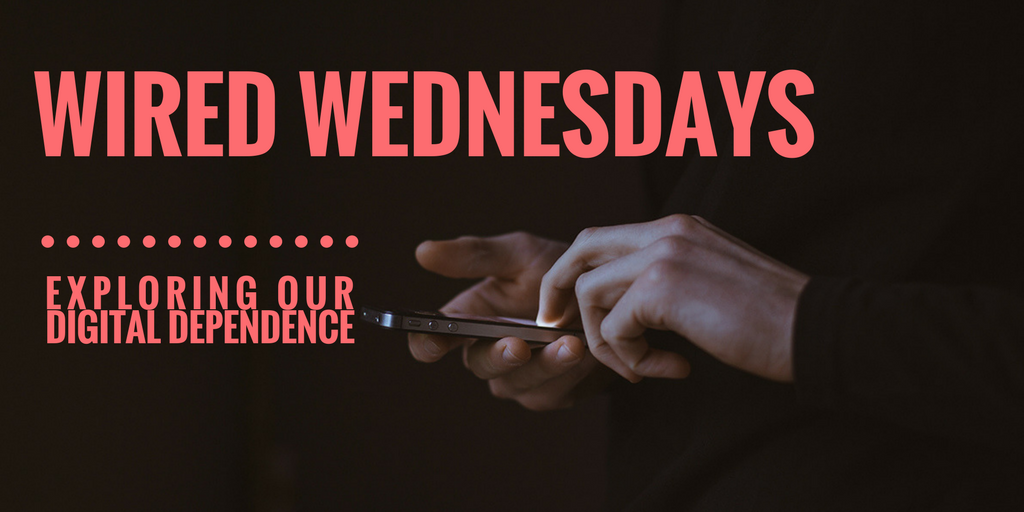
 My main concern in this exploration is the effect of digital dependence upon our social intelligence. You see, fostering robust development of the brain circuitry responsible for social intelligence is a key focus of Parenting for Peace. Self-regulation and inner mastery are key themes in this endeavor of raising a generation of peacemakers.
My main concern in this exploration is the effect of digital dependence upon our social intelligence. You see, fostering robust development of the brain circuitry responsible for social intelligence is a key focus of Parenting for Peace. Self-regulation and inner mastery are key themes in this endeavor of raising a generation of peacemakers.
From where we sit in today’s volatile world aswirl in disasters both natural and manmade, these words from the early pages of my book are chillingly relevant:
Many fields of research tend to affirm that we humans are indeed at a crucial moment in our evolution, and our survival is going to depend upon our realizing, deeply, that our true security is rooted in connectedness, in our relationships, in healthy interdependence with our fellow humans and with our natural environment.
(more…)
Tags: attachment, digital-dependence, handheld devices, smartphones, social intelligence, technology
Posted in Parenting for Peace | No Comments »
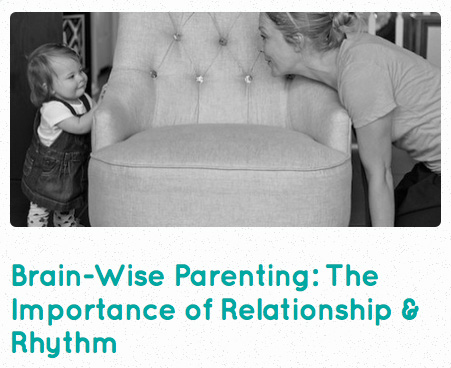
(Part 2 of my 5-part series at DrGreene.com) Yesterday I invited parents to relax about pushing academics for their wee ones, because their best preparation for true intelligence is play. But there is a very important area of your young child’s brain that does need active parental participation for optimally healthy development. It’s called the orbito-frontal cortex, or OFC for short.
The OFC is the seat of common sense thinking… the ability to read other people’s “signals” and recognize their intentions… to sense their emotions, and have empathy… to imbue intellectual thought with feeling, and vice versa — to moderate emotion with rational thought. In short, the OFC is the seat of social intelligence. It manages the skills of being truly human! {Read more at DrGreene.com}
Tags: attachment, brain development, interpersonal neurobiology, relationship, rhythm
Posted in Parenting for Peace | No Comments »
 August 11 was a day of two unrelated yet poignantly simultaneous events: the passing of Robin Williams, whose white-hot brilliance has often been characterized as other-wordly; and the celestial light-show of the Perseids meteor shower. As if heaven was welcoming its newest arrival with a fireworks display of thrilling extravagance befitting Robin’s unfathomable talent and heart.
August 11 was a day of two unrelated yet poignantly simultaneous events: the passing of Robin Williams, whose white-hot brilliance has often been characterized as other-wordly; and the celestial light-show of the Perseids meteor shower. As if heaven was welcoming its newest arrival with a fireworks display of thrilling extravagance befitting Robin’s unfathomable talent and heart.
That he was suffering so deeply came as a shock to even those who thought they knew him well. Insights into his psycho-history began emerging with revelations about his depression–possibly bipolar disorder; reports of his solitary childhood in an affluent family, being raised primarily by hired help; and Robin’s own recorded descriptions of using his comic gifts to make his mother laugh.
As people who were touched by Robin’s gifts, we feel sad. As parents who are raising children in this complicated world, we feel concern. Will our child grow up to wrestle with such demons? {Please read the rest at Natural Baby Pros}
Image
snowpeak under its Creative Commons license
Tags: addiction, attachment, bipolar, child-mental-health, David-Elkind, depression, Perseids, Robin-Williams, wonder
Posted in Parenting for Peace | No Comments »
We tend to throw around the word “attachment” a lot when talking about kids and parenting, so let’s make sure we’re all talking about the same thing: attachment is a measure of the security of relationship between a child and those one or two or three adults with whom that child is in consistent contact. We now recognize that healthy (secure) attachment is a fundamental form of nourishment for a child’s growing brain. In particular, attachment fosters rich circuitry in the area of the brain that mediates social and emotional functioning. A parent’s ability to be present for a child is fundamental to fostering this brain circuitry needed to regulate attention — therefore, basic ADHD treatment. Mounting research suggests that the social brain is the basis for the child’s lifelong success — in school, at home, and out in the world! (more…)
Tags: ADD, adhd, attachment, brain development, Dan Siegel, Gabor Mate, presence, social brain
Posted in Parenting for Peace | 2 Comments »
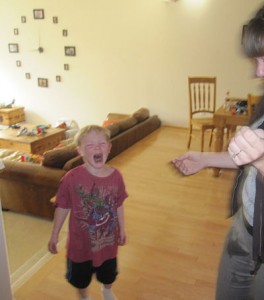 So there you are one afternoon, at the end of your rope with an out-of-control three-year-old. You know you won’t spank him, and you have become mindful of avoiding shame-based measures, so what’s left? Is “Time Out” the answer? At risk of bringing on the wrath of parents everywhere, my answer is no. Time-outs were conceived as a more humane alternative to spanking, but the problem is, they land a blow to the brain and psyche rather than to the bottom.
So there you are one afternoon, at the end of your rope with an out-of-control three-year-old. You know you won’t spank him, and you have become mindful of avoiding shame-based measures, so what’s left? Is “Time Out” the answer? At risk of bringing on the wrath of parents everywhere, my answer is no. Time-outs were conceived as a more humane alternative to spanking, but the problem is, they land a blow to the brain and psyche rather than to the bottom.
Right at the moment when the child is overwhelmed by a flood of emotions he cannot manage, and he most needs the regulating presence — that is, close physical presence — of his attachment figure, he’s banished to his room or his “Naughty Chair” or his “Thinking Rug” or his [fill in the blank with any of a list of prettied-up names people have devised for this particular form of exile]. (more…)
Tags: attachment, brain development, discipline, Gordon Neufeld, shame, social brain, spanking, time-out
Posted in Parenting for Peace | No Comments »
What Impairs Attachment?
 A big pet peeve of mine is the label “attachment disorder.” This is a diagnosis given to kids who have typically experienced severe disruption in the natural order of what should have been the effortless, instinctual connection we’re designed to make from the very beginning. They were prepared at the level of their brains, their hormones and their entire sensing organism to connect, to be skin-to-skin with oxytocin flowing and weaving the powerful bonding foundations for healthy attachment. They expected to connect.
A big pet peeve of mine is the label “attachment disorder.” This is a diagnosis given to kids who have typically experienced severe disruption in the natural order of what should have been the effortless, instinctual connection we’re designed to make from the very beginning. They were prepared at the level of their brains, their hormones and their entire sensing organism to connect, to be skin-to-skin with oxytocin flowing and weaving the powerful bonding foundations for healthy attachment. They expected to connect.
Many children with the most severe cases of “attachment disorder” had this expectation crushed in the most primal way. Can you think of a time when you were totally, ecstatically primed for a connection and it for whatever reason did not happen? Or it happened and then went away without warning or explanation? I’m speaking here of a romantic situation. Remember the disappointment, the deflation of your entire being? Now take that feeling and multiply it by an order of magnitude of a thousand. Ten thousand. As if there was nothing to you but that deflation, that floor pulled out from beneath you. As if the floor pulled out from beneath you was you. (more…)
Tags: attachment, attachment disorder, Gordon Neufeld, NICU, parent confidence, trust
Posted in Parenting for Peace | 3 Comments »
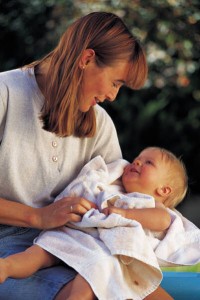 I write a lot about the central role of healthy attachment for child wellbeing. But what IS attachment and how do you get it?? It can be easy for someone like me who is steeped daily in the topic to take it for granted that people know what we mean when we say “attachment.” And as developmental psychologist author Gordon Neufeld has pointed out, attachment is not an intuitive word — in other words a word whose meaning is naturally and easily understood.
I write a lot about the central role of healthy attachment for child wellbeing. But what IS attachment and how do you get it?? It can be easy for someone like me who is steeped daily in the topic to take it for granted that people know what we mean when we say “attachment.” And as developmental psychologist author Gordon Neufeld has pointed out, attachment is not an intuitive word — in other words a word whose meaning is naturally and easily understood.
Author of an excellent book on attachment, Hold On to Your Kids, Neufeld points out that the word attachment was invented as a way to have a term to unify a science around. (The scientific study of attachment began in the 1950s with John Bowlby’s landmark work.) To further complicate our popular understanding of the concept, the term “attachment parenting” was copyrighted by William Sears. “So,” notes Neufeld, “now people know it as associated with a particular organization and particular strategies.” (Neufeld avoids using the term.) (more…)
Tags: attachment, attachment neurobiology, attachment parenting, Gordon Neufeld, interpersonal neurobiology, Mary Ainsworth, relationship
Posted in Parenting for Peace | No Comments »
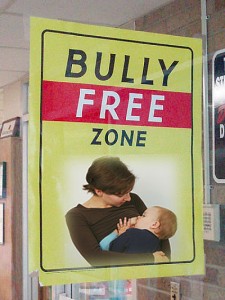 How perfect that October is Bullying Prevention Month and Attachment Parenting month — since healthy attachment is the first best anti-bullying program! Healthy attachment is the wellspring optimal brain development, especially the social brain circuitry that governs such anti-bullying capacities as self-regulation, empathy, trust, emotional and cognitive flexibility, and imagination.
How perfect that October is Bullying Prevention Month and Attachment Parenting month — since healthy attachment is the first best anti-bullying program! Healthy attachment is the wellspring optimal brain development, especially the social brain circuitry that governs such anti-bullying capacities as self-regulation, empathy, trust, emotional and cognitive flexibility, and imagination.
As I’ve written about in a prior post about the origins of empathy, my opinion (in agreement with many others) is that even the very best school-based anti-bullying or conflict resolution program puts the change lever in the wrong place — that is, way too far down a child’s developmental timeline: (more…)
Tags: attachment, attachment neurobiology, Attachment Parenting Month, brain development, Bruce Perry, Bullying Prevention Month, empathy, Jamie Lynne Grumet, pleasure, sociopathy, violence
Posted in Parenting for Peace | No Comments »




 So there you are one afternoon, at the end of your rope with an out-of-control three-year-old. You know you
So there you are one afternoon, at the end of your rope with an out-of-control three-year-old. You know you  A big pet peeve of mine is the label “attachment disorder.” This is a diagnosis given to kids who have typically experienced severe disruption in the natural order of what should have been the effortless, instinctual connection we’re designed to make from the very beginning. They were prepared at the level of their brains, their hormones and their entire sensing organism to connect, to be skin-to-skin with oxytocin flowing and weaving the powerful bonding foundations for healthy attachment. They expected to connect.
A big pet peeve of mine is the label “attachment disorder.” This is a diagnosis given to kids who have typically experienced severe disruption in the natural order of what should have been the effortless, instinctual connection we’re designed to make from the very beginning. They were prepared at the level of their brains, their hormones and their entire sensing organism to connect, to be skin-to-skin with oxytocin flowing and weaving the powerful bonding foundations for healthy attachment. They expected to connect. I write a lot about the central role of healthy attachment for child wellbeing. But what IS attachment and how do you get it?? It can be easy for someone like me who is steeped daily in the topic to take it for granted that people know what we mean when we say “attachment.” And as developmental psychologist author Gordon Neufeld has pointed out, attachment is not an intuitive word — in other words a word whose meaning is naturally and easily understood.
I write a lot about the central role of healthy attachment for child wellbeing. But what IS attachment and how do you get it?? It can be easy for someone like me who is steeped daily in the topic to take it for granted that people know what we mean when we say “attachment.” And as developmental psychologist author Gordon Neufeld has pointed out, attachment is not an intuitive word — in other words a word whose meaning is naturally and easily understood. How perfect that October is Bullying Prevention Month and Attachment Parenting month — since healthy attachment is the first best anti-bullying program! Healthy attachment is the wellspring optimal brain development, especially the social brain circuitry that governs such anti-bullying capacities as self-regulation, empathy, trust, emotional and cognitive flexibility, and imagination.
How perfect that October is Bullying Prevention Month and Attachment Parenting month — since healthy attachment is the first best anti-bullying program! Healthy attachment is the wellspring optimal brain development, especially the social brain circuitry that governs such anti-bullying capacities as self-regulation, empathy, trust, emotional and cognitive flexibility, and imagination. I was taken by the crucible called motherhood a quarter-century ago: my son Ian turns twenty-five today. The baby who was born smack on his auspicious due-date (seven-eleven!) arrived to find a mother in emotional disarray, to say the least. I have said it countless times, in keynote talks…classes for grad students…casual conversations…and even in my book: Motherhood brought me to my knees. Cracked me open. Excavated me. {
I was taken by the crucible called motherhood a quarter-century ago: my son Ian turns twenty-five today. The baby who was born smack on his auspicious due-date (seven-eleven!) arrived to find a mother in emotional disarray, to say the least. I have said it countless times, in keynote talks…classes for grad students…casual conversations…and even in my book: Motherhood brought me to my knees. Cracked me open. Excavated me. {

